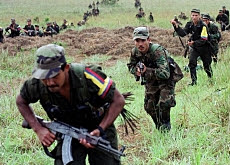Telling the Truth About the FARC

My wife lived and worked in Colombia for many years, including a stint at the U.S. Embassy in Bogata, and then spent a decade in Washington, D.C. working on Colombia policy, with a focus on cocaine and heroin trafficking. We met when we both worked at the White House Office of National Drug Control Strategy. (My wife and I jokingly tell people that we met doing drugs at the White House).
One of our great frustrations has always been the assumption by many of our progressive friends that FARC (the major guerrilla group in Colombia) is a legitimate leftist revolutionary movement. It is is not. It is a group of thugs. (What else do you call an organization that kidnaps children?) I was therefore pleased to see that Ben Whitford wrote a commentary for the Guardian Comment is Free group blog that makes this very point. Some highlights:
While the group's leaders still profess to share Chávez's leftist - and, increasingly, Bolivarian - ideals, the truth is that these days Farc is less a revolutionary outfit than a criminal enterprise with a vested interest in the status quo. Its struggle is inspired not by coherent ideological principles, but merely by avarice and the pursuit of power for its own sake.
The group's long march away from socialism stems in large part from the decimation of the Unión Patriótica, its political branch, by right-wing death squads during the 1980s. More than 3,000 of Farc's best political cadres were systematically gunned down, skewing the organisation's power balance toward its military wing and leaving its remaining leadership understandably cynical about the possibility of peaceful reform.
Since then, Farc has shown little inclination to participate in peace talks, and it has treated ceasefires merely as opportunities to regroup and prepare for further conflict. It's also speeded up its recruitment process at the expense of ideological indoctrination; the new wave of Farc troops - and, increasingly, junior officers - lack more than a nominal commitment to communism.
The group's political identity has been further eroded by its growing entanglement in Colombia's drug trade. The Farc now taxes all levels of drug production; the UN estimates that in 2003 the group made over $200m from the drug trade. And narco-trafficking has come to transcend ideology. In 2005, the International Crisis Group reported that Farc was systematically cooperating with its archrivals, the ultra-rightwing AUC militia, to produce and ship coca paste.
Along the way, Farc has lost any pretensions to popular support: national polls regularly show that less than 5% of Colombians support the guerrillas, and even in rural areas the group lacks any significant support base. The Farc's role as an occupying, rather than a liberating, army has been reinforced by its wanton disregard for civilian casualties. It persists in using landmines and gas-cylinder mortars, which cause massive collateral damage, and routinely tortures and kills peasants it suspects of supporting its enemies.
Then, of course, there's the kidnapping. The group's hostage-taking long ago became little more than a cash cow. Of the 700 or so hostages it currently holds, only a few dozen are of any political value. The rest are ordinary people, seized from as far afield as central Venezuela, being held merely for ransom; last week, even as Chávez called for Farc's recognition, the group seized another six tourists from a beach on Colombia's Pacific coast.
This, then, is the real Farc: not a band of Marxist rebels but a militarised criminal gang, inextricably tied to kidnapping and the drug trade. It has little or no popular support, and no political agenda to speak of. Even if it demobilised, it would fare poorly in elections. Ultimately, for Farc's leaders - whether we call them terrorists, insurgents or merely criminals - the bullet still holds far more appeal than the ballot box.
It's clear, of course, that talks are necessary - 40 years of fighting have shown that Farc can't be defeated through military action alone - but efforts to broker peace that don't acknowledge Farc's fundamentally non-political goals will inevitably fall short. Worse, Chávez's offer of unconditional recognition comes as the Farc are feeling the squeeze from Álvaro Uribe's tough anti-insurgency tactics. Ultimately, the Venezuelan leader's move risks relieving that pressure and giving the Farc the strength they need to fight on.
Read it all here.
Remember this the next time you hear someone complaining that President Uribe is not negotiating in good faith with the FARC.

Comments
Audio is available at the IRE website, but you need to be a member to access it.